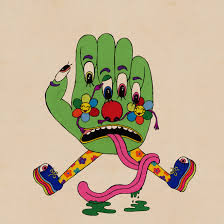Dan Deacon has found the comforts of life after death. Perhaps touring with Arcade Fire and making his Carnegie Hall debut was a jolt. Maybe the classical compositions of 2012’s America widened his eyes. Whatever the case, Baltimore’s ebullient electronic musician is once again, after 12 studio albums, testing his limits, but this time he’s found a happy medium between dissonance and melody – and it’s rolled up in a newfound yoga mat.
The classically-trained composer, mad scientist gear-head, and dance-off ringleader is calling out for participation-based aesthetic arrest on Gliss Riffer. He’s in his comfort zone, and, as we often like to act like it isn’t, that’s what works best. Write about what you know and your story will feel real. As brilliant as 2007’s breakthrough Spiderman Of The Rings is, it has its fair share of unctuous shrieking. Gliss Riffer encourages a departure from those obsequious tendencies while still brimming with unconventional, gaiety ideas. Even better, it sees Deacon singing.
Gliss Riffer is more than this. It’s the comfort immediately following the moment where the gravity of death no longer escapes you. The finality of life makes itself clear. The distance between the edge of the world and the shadow-splotched ground of nothingness fades from terrifying to interesting to inviting. That’s the colour of the next step, and 2014 saw Deacon looking over his shoulder at what he must one day leave behind. Hypervigilant, he hopes to explain it all while inviting others to look over the edge, to see the multicoloured gleam of total blackness, to let trepidation subside.
In the past, Dan Deacon took breaks from the circuit board to hide behind a vocoder. Singing is a radical expression that, for him, has never been the obvious instrument. He kneads his voice through manipulation to create fictitious personas, roving through the pitch-free vocal world while simultaneously enlisting an army of somber, militant soldiers, each bearing his loveable face. It begins with lead single ‘Feel The Lightening’ where he calls out to Tom Petty, Johnny Depp, and thousands of eyes. His vocals twist gender stereotypes in similar fashion to the video’s anthropomorphic furniture. He sings at a normal tempo, but records the music at a much slower rate. Later, the two are sped up. It’s safe. However, recent throat injuries from the America tour brought a major realisation to the forefront: vocals aren’t permanent. Cue the nervous frenzy. The glitch-heavy days of Acorn Master are long gone. This is Dan Deacon’s transformation into a songbird.
His most poignant and personal storytelling to date takes flight on ‘When I Was Done Dying’. Musically, it swirls with ribbon-like xylophones and pulsing drums a la ‘Wham City’. Lyrically, it’s his most deeply personal and destabilised revelation. He wants to talk and, for once, he wants us to hear it. "And I said all my prayers/Because surely I died," he sings. "I felt no reason to fear and no reason to hide." Deacon outlines a fantastical climb into heaven and encounters with unfathomable creatures where, once his face is unwillingly removed, he’s told "Better luck next time/ Don’t worry so much" as a verbal slip of advice. It’s a perfectionist’s acceptance of the woozy snowballing of death and the maelstrom that occurs when grappling with the synthetic concept of life in a painted void.
The comfort of Gliss Riffer floods warmth into the Pogo-like ‘Meme Generator’ and unfettered Technicolor manic of ‘Mind On Fire’. Yet even with their scrappy morass, the songs are too manicured. The slow warmth of ‘Snookered’ and ‘Prettyboy’ is absent. Had it not been intentional, it would be an obvious flaw. Instead, Deacon is asking more of his listeners. There’s a quiet hope that songs will be viewed as a part of the whole, not as a tracklist of hits, but given his resume, it feels off.
Then comes a quick sleight of hand. Deacon swaps ecstasy for a phenobarbital. The final three tracks—’Learning To Relax’, ‘Take It To The Max’, and ‘Steely Blues’—let a sedative calmness wash over them, even while notes flash vibrantly, obnoxiously, in the rearview. It’s a careful omission. Combined, the three impersonate Laurie Anderson’s ‘O Superman’. A repeated flatness warps until madness, instills fear, appeals to your emotions, and convinces you to accept the emergent cavity. The irrevocably buzzed find a tranquility amidst jitters. Chiptune befriends clutter. Deacon, at long last, opens his arms wide to give his fears a bear hug before the illusory coffin door closes.
Gliss Riffer is the first time Dan Deacon has recorded and produced an album in its entirety since Spiderman Of The Rings, and his fingerprints are visible on every knob. After America‘s hyper-sensitive harsh tones, it acts as the cool-down phase where weight is applied via repetition. He’s a man focused on upholding the importance of innovation while simultaneously creating a community; this is the natural step forward. If ‘Wooody Wooodpecker’ was our introduction to the cacophony in Deacon’s brain, Gliss Riffer is a magnifying glass held to that opening in one hand and an opium pill twirling between his index and ring fingers in the other, egging on the impending lucid dream that’s been in the works for years. He’s only now offering an audacious embrace.
<div class="fb-comments" data-href="http://thequietus.com/articles/17311-dan-deacon-gliss-riffer-review” data-width="550">


